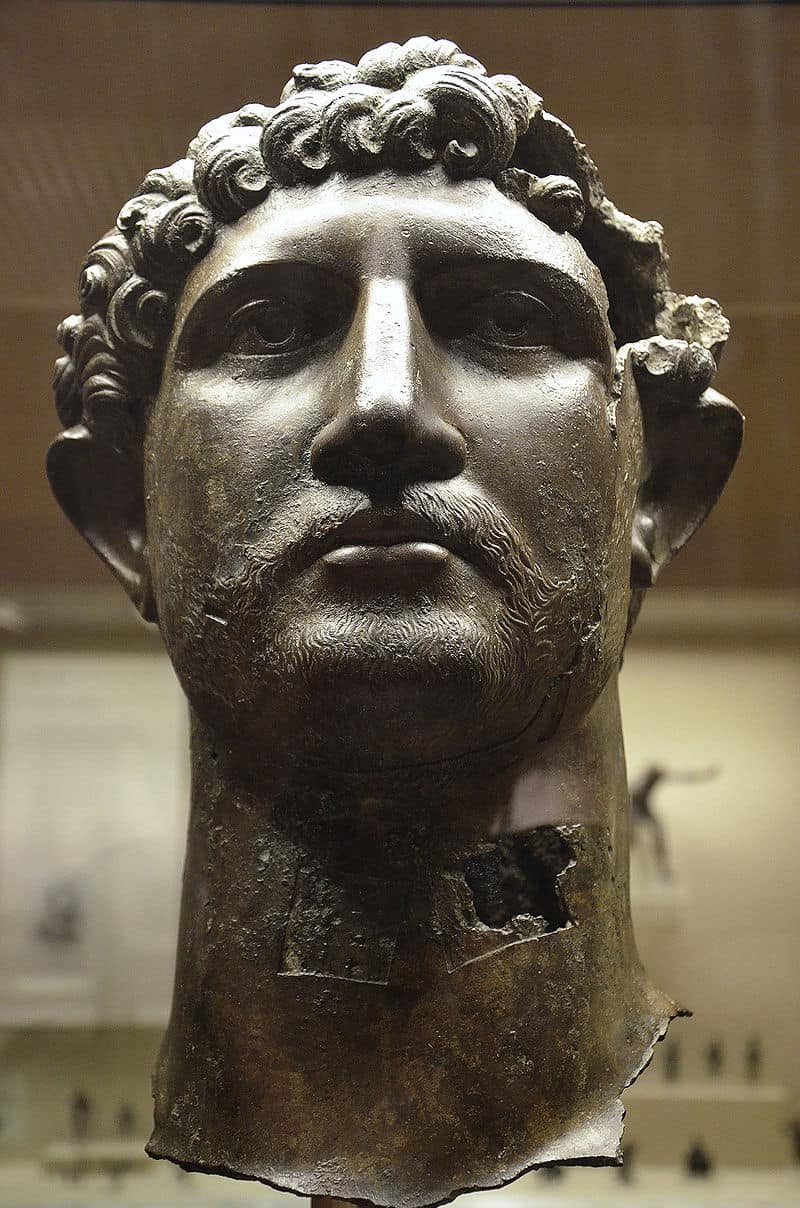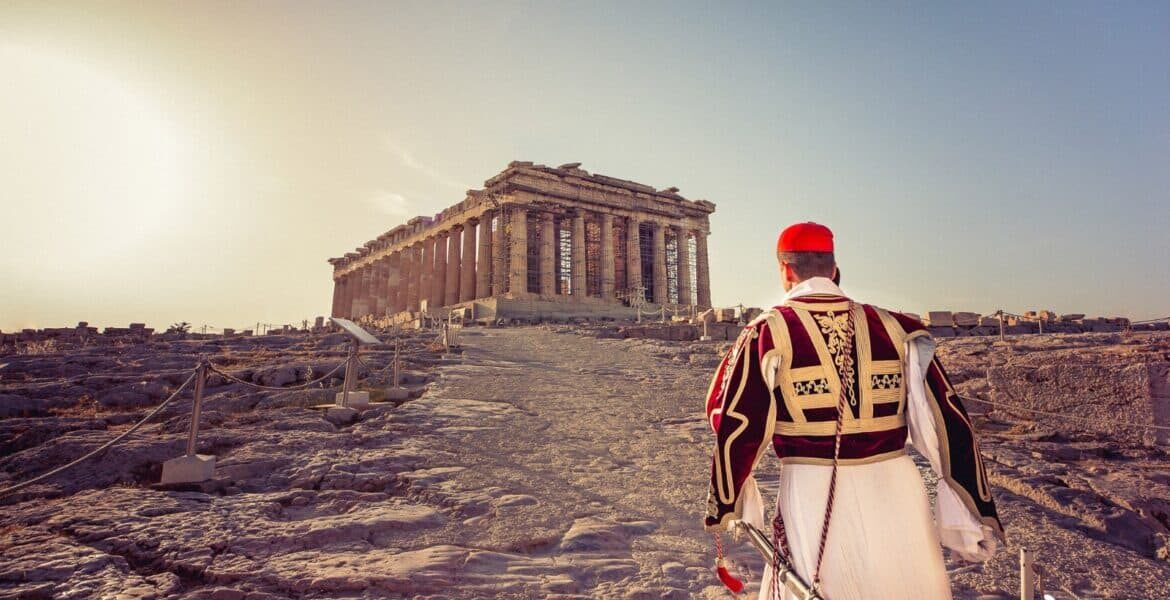That we've broken their statues,
that we've driven them out of their temples,
doesn't mean at all that the gods are dead.
- IONIAN, Constantine Cavafy
Two ancient Romans also play a role in our story, a lawyer and an emperor. The lawyer, Marcus Tullius Cicero, was one of the classical world’s greatest public speakers, moral philosophers, courtroom lawyers and prose stylists. Schoolboys learning Latin usually started by studying Julius Caesar for his brilliant economy of language: “Veni, Vidi, Vici” (“I came; I saw; I conquered.”) was his entire report back to the Roman Senate after conquering the vast nation of Gaul. This was how we all wanted to write as well (no subordinate clauses!), and probably how most of us wanted to be when we were all grown up and had armies to command and lands to conquer. What was there not to love about Caesar? However, our teachers had other things in mind and turned us gradually to an admiration of Cicero’s prose style and his ability to defeat tyrants and crooks in court rather than on the battlefield. Although it didn’t involve riding a horse or wearing a sword, fighting for justice rather than power and glory also exerted a strong pull on our young imaginations. For example, Cicero’s prosecution of Gaius Verres, the corrupt and greedy governor of the Roman province of Sicily, was, in its own way, as thrilling and dramatic as anything Caesar ever did with his 10th Legion.
Verres - The Looter
Often cited as the model for Lord Elgin’s collecting activities in Athens, Verres was one of the most notorious looters of culture heritage in European history. Before being brought up for corruption charges in the Roman Senate, Verres used to brag to his friends that, “the only people who should fear prosecution are those who steal just enough to satisfy themselves, whereas I have stolen enough to satisfy many others as well.” According to Cicero: “Ancient monuments, given by wealthy monarchs to adorn the cities of Sicily, were ravaged and stripped bare, but not only statues and monuments, but also the most sacred and revered Sicilian sanctuaries and holy shrines. If only Verres detected a fine work of art or a valuable antique, it would not be left in the possession of the Sicilians.” One of Cicero’s most famous courtroom speeches, addressed directly to Verres, sounds all too familiar to those considering the repatriation of the sculptures Lord Elgin stripped from the Parthenon to decorate his Broomhall Manor in Scotland:
“You, Verres, will plead that your statues and pictures have also adorned the city and the forum of the people of Rome… a decoration splendid to the eye, but painful and melancholy to the heart and mind: I look with sadness at the brilliant show that was made by your thefts, by the robbing of our provinces, by the spoliation of our friends and allies… while many persons from Asia and Greece, who happened at the time to be serving on diplomatic delegations, beheld in our forum the revered images of their gods that had been carried away from their own sanctuaries … and would stand gazing at them with weeping eye.”
Seeing that the game was up, Verres fled the country halfway through the trial. But this opening speech, along with several others which Cicero had prepared to deliver in court but then simply published, established the principle that certain examples of great art are not just property, to be bought and sold, but actually constituted a people’s heritage because of its continuing significance to that people and because of the lessons it held for future generations. This is also what the Islamic code of “Ibrah” had to say about protecting the historic and religious monuments under the stewardship of the Ottoman Empire when Elgin was Britain’s Ambassador to the Sublime Porte. This was, in fact, the very sense and purpose of the British Parliament’s 1882 Ancient Monuments Protection Act (and subsequent Acts designed to protect Britain's own cultural heritage), which called for heavy penalties for “removing fixtures from listed buildings”. There is irony here.
Friendship
Cicero made a name for himself as a lawyer with his prosecution of Verres and with his defense of innocent citizens, but it was in his writings on moral philosophy, citizenship, cooperation and other human qualities that his contribution was perhaps the most enduring and profound. In his essay De Amicitia (“On Friendship”) Cicero used the dramatic form of a conversation among friends to explore a subject he considered important above all others:
“All I can do is urge you to regard friendship as the greatest thing in the world; for there is nothing which so fits in with our own nature or is so exactly what we want and need in prosperity or adversity… True friendship is rare – it involves real sympathy in all matters of importance, plus goodwill, generosity, mutual respect and affection… Friendship provides hope for the future.” His point is that within the context of friendship between individuals - and nations - our best qualities grow and flourish. And so, while we started with Verres and Elgin, it is now time to consider the virtuous and the valiant.

Hadrian - The Lover
Emperor Hadrian loved Greece and wanted Athens to become the cultural capital of the Roman Empire, a project Pericles would have commended, especially since it involved a vast building program including libraries, temples, theatres, roads, walls and aqueducts. A military commander, like so many other Roman emperors, Hadrian also tried to absorb and apply the arts and philosophy of classical Greece in all aspects of his reign, from music and architecture to his choice of a stoic philosopher, Marcus Aurelius, as his successor. Both Niccolò Machiavelli and Edward Gibbon listed him among the “five good Emperors of the Roman Empire”, while we merely want to note that Hadrian set a pattern for admiring and assisting Greece that continues to this day, with the obvious difference that Hadrian had the means, vision and power to effect great changes at will. And while Hadrian was the original philhellene, those who came after him played an even more critical role in this story.
Two Bridges – Empathy and Education
Over the centuries, two bridges have traditionally led foreigners to cross over from interest to infatuation with Greece. To spend time in Greece itself, with its unique light, air, land and people – is the bridge of the senses and of the heart, both of which seem to expand and grow the longer we stay and the better we get to know a Greek friend or family. The other bridge is education: classical, liberal, scientific or accidental. At every turn, if you delve deep enough, you end up in Greece, with: Homer, Democritus, Sophocles, Plato, Pericles, Phidias or Archimedes. Most visitors have a story involving some 4th-grade teacher, grandmother or book which opened a door for them to a place from which they never fully returned. In Britain especially, generations of schoolmasters, understanding the effects of a close, early encounter with the ancient world, created a system of classical education that molded and inspired generations of youths and set them in motion toward Greece, intellectually and often in fact.
Next week: We are going to look at some of these British philhellenes and contemplate, like Cicero, the meaning of true friendship.
ABOUT THE PARTHENON REPORT | DON MORGAN NIELSEN:
In this bicentennial year since the birth of the modern Greek State, of both pandemic and celebration, Greek City Times is proud to introduce readers to a weekly column by Don Morgan Nielsen to discuss developments in the context of history, politics and culture concerning the 200-year-old effort to bring the Parthenon Sculptures back to Athens.
Classicist, Olympian and strategic advisor, Don Morgan Nielsen is currently working with a growing international team to support Greece’s efforts to repatriate the Parthenon Sculptures.
Click here to read ALL EDITIONS of The Parthenon Report by Don Morgan Nielsen
Feature Image : Copyright Nick Bourdaniotis | Bourdo Photography

